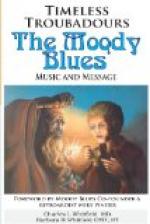The troubadours who were established more or less permanently as court poets under a patron lord were few; a wandering life and a desire for change of scene is characteristic of the class. They travelled far and wide, not only to France, Spain and Italy, but to the Balkan peninsula, Hungary, Cyprus, Malta and England; Elias Cairel is said to have visited most of the then known world, and the biographer of Albertet Calha relates, as an unusual fact, that this troubadour never left his native district. Not only love, but all social and political questions of the age attracted their attention. They satirised political and religious opponents, preached crusades, sang funeral laments upon the death of famous patrons, and the support of their poetical powers was often in demand by princes and nobles involved in a struggle. Noteworthy also is the fact that a considerable number retired to some monastery or [13] religious house to end their days (se rendet, was the technical phrase). So Bertran of Born, Bernart of Ventadour, Peire Rogier, Cadenet and many others retired from the disappointments of the world to end their days in peace; Folquet of Marseilles, who similarly entered the Cistercian order, became abbot of his monastery of Torondet, Bishop of Toulouse, a leader of the Albigeois crusade and a founder of the Inquisition.
CHAPTER II [14]
THE THEORY OF COURTLY LOVE
Troubador poetry dealt with war, politics, personal satire and other subjects: but the theme which is predominant and in which real originality was shown, is love. The troubadours were the first lyric poets in mediaeval Europe to deal exhaustively with this subject, and as their attitude was imitated with certain modifications by French, Italian, Portuguese and German poets, the nature of its treatment is a matter of considerable importance.
Of the many ladies whose praises were sung or whose favours were desired by troubadours, the majority were married. Troubadours who made their songs to a maiden, as did Gui d’Ussel or Gausbert de Puegsibot, are quite exceptional. Love in troubadour poetry was essentially a conventional relationship, and marriage was not its object. This conventional character was derived from the fact that troubadour love was constituted upon the analogy of feudal relationship. If chivalry was the outcome of the Germanic theory of knighthood as modified by the influence of Christianity, it may be said that troubadour love is the [15] outcome of the same theory under the influence of mariolatry. In the eleventh century the worship of the Virgin Mary became widely popular; the reverence bestowed upon the Virgin was extended to the female sex in general, and as a vassal owed obedience to his feudal overlord, so did he owe service and devotion to his lady. Moreover, under the feudal system, the lady might often be called upon to represent her husband’s suzerainty to his vassals, when she was left in charge of affairs during his absence in time of war. Unmarried women were inconspicuous figures in the society of the age.




